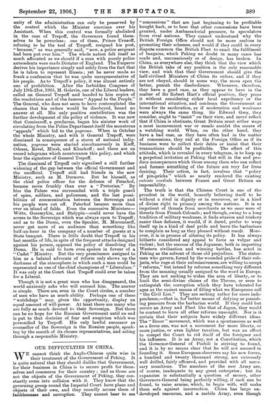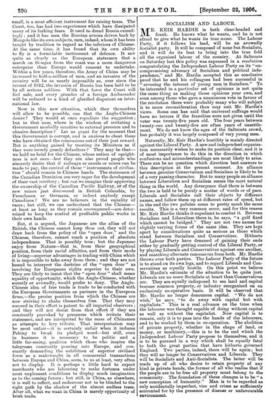OUR DIFFICULTIES IN CHINA.
%XTE cannot think the Anglo-Chinese quite wise in their treatment of the Government of Peking. It is quite natural that they should dislike that Government, for their business in China, is to secure profit for them- selves and commerce for their country ; and. as those are not the objects of the Government of Peking, they con- stantly come into collision with it. They know that the governing group round. the Imperial Court have plans and objects of their own, and they roundly accuse them of faithlessness and corruption. They cannot bear to see " concessions " that are just beginning to be profitable bought back, or to hear that other concessions have been granted, under Ambassadorial pressure, to speculators from rival nations. They cannot understand why the British Foreign Office should not be more zealous in promoting their schemes, and would if they could in every dispute summon the British Fleet to exact the fulfilment of bargains, which Peking no doubt in many cases has made and, unconsciously or of design, has broken. In China, as everywhere else, they think that the view which the British take of any position is the only reasonable view, and wish that their Government should give the half-civilised Ministers of. China its orders, and if they are not obeyed, should in some way, the more open the better, punish the disobedience. Whenever, therefore, they have a good case, as they appear to have in the matter of Sir Robert Hart's official position, they press it without considering either local expediency or the international situation, and condemn the Government at home for its moderation, as if moderation and weakness were always the same thing. Sir Edward Grey, they consider, ought to "insist" on their view, and never reflect that if China is obstinate, Great Britain must either wage a most inconvenient war or recede amidst the sneers of a watching world. When, on the other hand, they have a bad case, as they have often had in the matter of concessions, they rail at the Foreign Office as if its business were to collect their debts or insist that their transactions should be profitable. The effect of this attitude, which is revealed in every telegram, is to keep up a perpetual irritation at Peking that will in the end pro- duce consequences which those among them who can reflect and foresee something of the future are very far from desiring. Their action, in fact, involves that "policy of pin.pricks " which so nearly rendered the existing entente cordiale between France and Great Britain an impossibility.
The truth is that the Chinese Court is one of the proudest in the world, honestly believing itself to be without a rival in dignity or in resources, or in a kind of divine right to primacy among the nations. It is as impatient of threats from merchants as we once were of threats from French Colonels ; and though, owing to a long tradition of military weakness, it finds evasion and trickery easier than defiance, it would, if it dared, prefer to wrap itself up in a kind of deaf pride and leave the barbarians to complain as long as they pleased without result. More- over, it is in process of altering its policy. It has always hitherto considered any appeal to force as vulgar and violent; but the success of the Japanese, both in importing Western civilisation and winning battles, has acted in Peking as the solvent of those old prejudices. The states- men who govern, forced by the wounded pride of their sub-. jects, who rage at their submissiveness, are willing to accept "reforms," but intend by reforms something very different from the meaning usually assigned to the word in Europe. They are not seeking to widen the area of liberty, or to limit the semi-divine claims of the Throne, or even to extinguish the corruption which they have tolerated for ages as the easiest means of filling what we Europeans call "the Civil List." They are seeking rather for more inde- pendence,—that is, for better means of defying or punish- ing pressure from the barbarian world. If they could but secure an Army and Fleet like that of Japan, they would be content to leave all other reforms unsought. Nor is it certain that their subjects have widely different ideas. The " Boxer " movement, which was a spontaneous as well as a. fierce one, was not a movement for more liberty, or more justice, or even lighter taxation, but was an effort to compel the Court to rid itself of the foreigner and his influence. It is an Army, not a Constitution, which the Governor-General of Pechili is striving to found, and. it is by no means clear that he will not succeed in founding it. Some European observers say his new forces, a hundred and twenty thousand strong, are extremely well drilled, fairly officered, and provided with all neces- sary munitions. The numbers of the new Army are, of course, inadequate to any great enterprise ; but its expansion is substantially a question of money, other Governors-General being perfectly willing, if cash can be ,found, to raise armies, which, to begin with, will make them safe against insurrection. China has large un- developed resources, and a mobile Army, even though small, is a most efficient instrument for raising taxes. The Court, too, has had two experiences which have dissipated many of its lurking fears. It used, to dread Russia exceed- ingly; and it has seen the Russian armies driven back by Mongols like its own subjects, men, indeed, whom it has been taught by tradition to regard as the inferiors of Chinese. At the same time, it has found that its own ability to fly is a formidable instrument of defence. It saw quite as clearly as the European statesmen that a march on Si-ngan from the coast was a more dangerous enterprise than Europe would consent to undertake. Within a few years, therefore, the Army of China may be increased to half-a-million of men, and an invasion of the country will be as nearly impossible as, ever since the retreat of.1812, the invasion of Russia has been held to be by all serious soldiers. With that force the Court will feel safe, and every grandee of a foreign Ambassador will be reduced to a kind of glorified disputant on inter- national law.
Now is this new situation, which they themselves will allow to be possible, one that the Anglo-Chinese desire ? They would at once repudiate the suggestion ; but in that case, where is the wisdom of irritating a Government morbidly sensitive to external pressure and to abusive description ? Let us grant for the moment that this Government is corrupt, and is anxious to cheat those who have obtained the concessions out of their just reward. But is anything gained by treating its Ministers as if they were merely greedy defaulters ? They may be that— we hold no brief for the Chinese, whose notion of upright- ness is not ours—but they are also proud people who sincerely desire that if railways or canals or mines can be made to pay, the control of those "instruments of civilisa- tion" should remain in Chinese hands. The statesmen of the Canadian Dominion are very eager for the development of their vast territory ; but can we imagine their approving the ownership of the Canadian Pacific Railway, or of the new mines just discovered in British Columbia, by Frenchmen or Germans, or indeed anybody except Canadians ? We are no believers in the equality of races; but still, we can understand that the Chinese— at least as long as they remain unconquered—are deter- mined to keep the control of profitable public works in their own hands.
But, it is argued, the Japanese are the allies of the British, the Chinese cannot keep them out, they will not draw back from the policy of the "open door,'' and the Chinese, therefore, cannot reach a position of absolute independence. That is possibly true; but the Japanese enjoy from Nature—that is, from their geographical position, from their racial affinities, and from their mode of living—superior advantages in trading with China which it is impossible to take away from them ; and they are not bound to interpret the doctrine of the "open door" as involving for Europeans rights superior to their own. They are likely to insist that the "open door" shall mean equality of opportunity, which the Anglo-Chinese, whether secretly or avowedly, would prefer to deny. The Anglo- Chinese idea of free trade is trade to be conducted with the European Governments as partners in the European firms,—the precise position from which the Chinese are now striving to shake themselves free. That they may succeed in their effort is patent to all impartial observers ; and they will not desist from that effort if they are constantly provoked by pressures which irritate their statesmen, and are interpreted by the mass of Chinamen as attempts to levy tribute. That interpretation may be most unfair—it is certainly unfair when it induces Peking to break its pledged word—but still, even in business it is necessary to be politic and a little far-seeing, qualities which those who inspire the telegrams constantly pouring into Europe, and con- stantly demanding the exhibition of superior civilised force as a makeweight in all commercial transactions between Europe and China, seem, to us at least, very often not to display. It is perhaps a little hard to expect merchants who are labouring to make fortunes under most unpleasant conditions to display much imagination as to the coming future ; but still, in China, as elsewhere, it is well to reflect, and endeavour not to be blinded to the right path by the shadow of the almost endless trees. After all, what we want in China is merely opportunity of brisk trade.







































 Previous page
Previous page